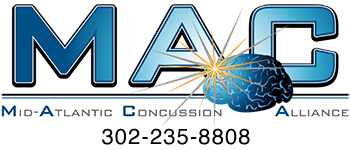We at MAC Alliance use a wide array of concussion and brain health testing tools to screen, diagnosis and treat brain injuries. They include neurocognitive brain testing, EEG technology, infrared eye-tracking screening and other advanced tools. Now, according to some new groundbreaking research, we may someday be adding a saliva test for concussions to our high-tech toolbox.
Saliva Testing Offers Promising Portable Concussion Screening Possibilities
In a study published in October 2020 in the journal Clinical and Translational Medicine, 538 participants across 11 clinical sites were given a series of saliva tests. Among the participants, 50% had experienced a concussion, while the other half had different conditions with symptoms that can present as concussion symptoms, such as attention deficit hyperactivity disorder (ADHD), chronic headaches, anxiety, and depression. The researchers from Penn State’s College of Medicine were able to tell who in the group were the ones who had experienced concussion by analyzing for tiny strands of micro ribonucleic acid (microRNA) in the mouth.
How the Concussion Detection in Saliva Works
ScienceDaily offers a good breakdown of the science behind the test: The analyzed saliva samples of microRNA, which are found in high amounts in the brain and play an important role in cellular processes can be found in the mouth thanks to the presence of cranial nerves there. The theory is that altered microRNA levels in a patient’s spit sample may indicate a concussion.
The concussion saliva test, or “spit test” as it’s becoming known, holds promising applications (in sports in particular) for areas where some data can be deemed subjective, such as when an athlete might underreport symptoms in order to return faster to the playing field. While the test itself still needs refining to ensure that false positives or negatives won’t erroneously lead athletes back to competition or training when they aren’t fully recovered, once perfected, this spit test could be as widely implemented as saliva testing done to determine hormone and drug levels and, most recently, for testing patients for positive COVID-19 results.
Current Technology for Advanced Concussion Diagnosis
MAC Alliance currently utilizes today’s latest technologies for concussion screening, diagnosis and treatment. And we’re always excited to hear about new research being conducted that might help us offer even more enhanced services down the road. We know that it’s important that concussions are properly and promptly assessed, since early detection can often improve long-term clinical outcomes.
One of the challenges with head injuries is that the signs of concussion can be subtle. For instance, when you cut yourself, you usually bleed. If you fall, you may see a bruise or swelling. But with concussions, there normally are no visible signs of injury. The TV version of a concussion, where an individual sustains a head injury and immediately loses consciousness, actually occurs in less than 10% of individuals. So much of the assessment depends on information correctly relayed by the patient.
How Do Concussions Occur?
A concussion is a mild traumatic brain injury (mTBI) that is caused by a bump, blow or jolt to the head, or any sort of hit to the body that causes the head and brain to move rapidly back and forth. The Centers for Disease Control and Prevention’s CDC Heads Up Initiative explains that this sudden movement can actually cause the brain to bounce around or twist in the skull. This can create chemical changes in the brain, and can even cause stretching and damaging to the brain cells.
Jolts to the brain like this can cause concussions that aren’t visible. The possible injuries patients incur are functional rather than structural. Moreover, some symptoms occurring days or weeks later may not correctly be associated with concussion if the individual hasn’t been properly diagnosed. With nearly 3 million concussions occurring in the U.S. each year, you can see why prompt and timely diagnosis is so important.
What Are the Symptoms of a Concussion?
Concussion symptoms can include:
- Excess fatigue
- Memory loss
- Sadness, irritability and/or depression
- Feeling dazed and confused
- Slow or slurred speech
- Headaches
- Balance issues
- Nausea
- Sensitivity to light
- Numbness or tingling
What Should You Do if You Suspect a Concussion?
Even if you don’t have symptoms, if you or a loved one has experienced an injury that could have caused a concussion, consult a healthcare provider that specialized in brain health. They can test functions like memory, concentration, balance, coordination and reflexes. For student athletes, more and more schools are offering baseline concussion testing prior to competitive seasons, so that in the event of a suspected TBI, students’ post-injury baseline results can be compare to pre-injury ones for a more rapid and informed diagnosis.
Don’t Delay Concussion Assessment
At MAC Alliance we currently use a variety of today’s latest technologies to screen, diagnose and treat concussion patients. These include vestibular exam assessments, ImPACT® neurocognitive testing, BrainScope® One EEG technology, Cambridge Brain Sciences (CBS Health) testing, RightEye® infrared eye tracking and the EyeGuide Focus eye-tracking tool. To find a MAC Alliance partner in your area, visit our Find a MAC Center page.
We are also proud to introduced our new MAC Brain Health Cart, a truly portable, accurate and easy-to-administer system created to supply other practitioners speedy access to our neurocognitive and vestibular screening, diagnosis and treatment technology, where ever they are located. If you are a medical practitioner interested in the MAC Brain Health Cart to enhance patient outcomes, please contact us today.











